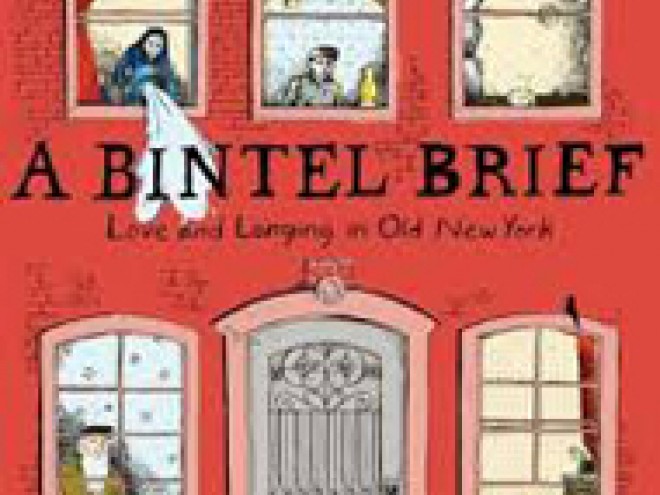Liana Finck is an emerging graphic novelist. She was a Fulbright Fellow in Brussels in 2009-10 and is a Six Points Fellow in New York. She publishes in The Forward Newspaper and Tablet Magazine. Her graphic novel, A Bintel Brief, was published by Ecco. She will be blogging here all week for Jewish Book Council and MyJewishLearning.
 In January 1906, a woman wrote a letter to a Yiddish daily newspaper called the Forward, to complain that her watch had disappeared. The letter was written in choppy Yiddish; the woman was not used to writing and it was obviously a struggle for her to put her thoughts on paper. The watch was the woman’s only valuable possession. When her son, who supported the family, couldn’t find work, she would pawn the watch so that they’d be able to buy food. The woman suspects her neighbor, an even poorer woman, of taking the watch. She writes “Now the watch lies in the hands of your pawnshop man and not in the hands of my pawnshop man.”
In January 1906, a woman wrote a letter to a Yiddish daily newspaper called the Forward, to complain that her watch had disappeared. The letter was written in choppy Yiddish; the woman was not used to writing and it was obviously a struggle for her to put her thoughts on paper. The watch was the woman’s only valuable possession. When her son, who supported the family, couldn’t find work, she would pawn the watch so that they’d be able to buy food. The woman suspects her neighbor, an even poorer woman, of taking the watch. She writes “Now the watch lies in the hands of your pawnshop man and not in the hands of my pawnshop man.”
At first, the newspaper editor who read the letter thought the woman had written it in spite, and was trying to shame her neighbor. But on closer inspection, he realized that the letter was actually an exercise in tact. The woman didn’t want to hurt her neighbor’s feelings by confronting her; but she knew the neighbor read the Forward, and hoped to plead with her anonymously through its pages. The letter ends: “I swear on the life of my sick husband that I will remain your friend…just send me the pawn ticket in the mail and I won’t say a word… But give me back my bread.”
The Forward’s editor, Abraham Cahan, published the letter the next day, under a new heading, “A Bintel Brief” — a bundle of letters. The advice column ran in Forward for the next sixty years. A Bintel Brief was an advice column to the highest degree and the most operatic power. Through it, young, alienated Jewish immigrants from Eastern Europe were given a rare chance to be heard. Mothers wrote in to find the children they’d put up for adoption; despairing people were urged against suicide; starving families were directed to charity organizations; fathers with tuberculosis bared their sorrows about not being allowed to hug their children; women publicly shamed their ‘missing’ husbands. Heavy stuff. And yet: the letters have the anecdotal lightness you’d expect of a more normal advice column. They are surprisingly sweet, often funny — like small, brightly lit windows into the lives of people caught at their most vulnerable, who, through some trick of the printed word, seem like characters in the best kind of fairytale; their lives are hard, but their sadness has meaning, their difficulties are tempered by something otherworldly. Cahan read the letters and answered them concisely, in a fatherly, rabbinical voice.

On the side, Cahan wrote novels in English about his world. He wanted to educate the American public about the Jewish immigrants and where they’d come from. His books were radical — no one wanted to read a novel about the New York slums, or the Jews. His most famous novel is called The Rise of David Levinsky. It is a Dickensian tragedy about the American dream, and is full of vivid details from a vanished New York, as well as the thriving Jewish towns in Eastern Europe that have been destroyed since then.
Read more about Liana Finck here.
Related Content:
Liana Finck is the author of Passing for Human and Excuse Me and a regular contributor to The New Yorker. She is a recipient of a Fulbright Fellowship, a New York Foundation for the Arts Fellowship, and a Six Points Fellowship for Emerging Jewish Artists. She has had artist residencies with MacDowell, Yaddo, the Lower Manhattan Cultural Council, Headlands Center for the Arts, and Willapa Bay.



